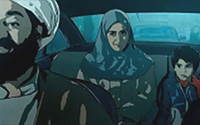| SHADOWS ON THE WALL | REVIEWS | NEWS | FESTIVAL | AWARDS | Q&A | ABOUT | TALKBACK | ||
 Shadows off the beaten path Shadows off the beaten path | ||
| Indies, foreigns, docs, revivals and shorts... | ||
|
On this page:
BORDER |
HEAVY TRIP TEHRAN TABOO | WAJIB < < F O R E I G N > > last update 5.Oct.18 See also: SHADOWS FILM FESTIVAL | ||
| R E V I E W B Y R I C H C L I N E | ||
Border
 Gräns
MUST Gräns
MUST  SEE SEE
| ||
|
dir Ali Abbasi scr Ali Abbasi, Isabella Eklof, John Ajvide Lindqvist prd Nina Bisgaard, Peter Gustafsson, Petra Jonsson with Eva Melander, Eero Milonoff, Jorgen Thorsson, Ann Petren, Sten Ljunggren, Viktor Akerblom, Rakel Warmlander, Kjell Wilhelmsen, Andreas Kundler, Matti Boustedt, Joakim Olsson  release Swe 31.Aug.18,
release Swe 31.Aug.18, UK Oct.18 lff, US 26.Oct.18 18/Sweden 1h48 TORONTO FILM FEST  THESSALONIKI FILM FEST
|  This Swedish film is such a genre mash-up that it's relentlessly surprising, with an engaging through-line that also makes it darkly satisfying. Mixing comedy, romance, mystery, horror and Norse mythology, each scene provides a thrill of the unexpected as secrets are revealed and the interconnections between the rather oddball characters continually shift.
This Swedish film is such a genre mash-up that it's relentlessly surprising, with an engaging through-line that also makes it darkly satisfying. Mixing comedy, romance, mystery, horror and Norse mythology, each scene provides a thrill of the unexpected as secrets are revealed and the interconnections between the rather oddball characters continually shift.
Feeling like a misfit with her heavy brow, protruding teeth and unusual physicality, Tina (Melander) has found her perfect job as a ferry port customs agent, because she's able to smell passengers' guilt and shame. She lives in a woodland cabin with companion Roland (Thorsson), who's more interested in his show-dog Rottweilers than in Tina. One day at work, she stops Vore (Milonoff), who has a similarly prehistoric look, and they realise that they have rather a lot in common. This pushes Tina to confront her increasingly senile father (Ljunggren) about her true past. Tina's special gift has also caught the eye of the police, who have asked her to sniff out a paedophile ring in a nearby town. And this adds to Tina's strong sense of usefulness, even as Vore is undermining it by appealing to her deeper nature. Filmmaker Abbasi tells this story with plenty of wit, dark intensity and earthy emotion, augmented by gorgeously dense fairy-tale cinematography by Nadim Carlsen and particularly astonishing prosthetic make-up. Each scene looks amazing, drawing the audience in just as much as the unpredictable narrative. Melander delivers a remarkably subtle performance for an actor wearing such extensive make-up. But it looks utterly real, and she plays Tina with a lovely combination of vulnerability and inner strength. This is a woman who has always been told to be ashamed of herself, and watching her learn to see her physicality as a strength is remarkable. Milonoff is equally strong, in a slightly less endearing way. And the other cast members add little quirks to their characters to bring themselves vividly to life. At the centre, this is obviously a parable about self-image, but Abbasi never lays this on thickly, instead letting the narrative unfold in an unusually gentle, organic way. Even when things take disturbing turns, the film has a warm tone that continually keeps us off-balance, reminding us that perhaps the craziest things in the world around us are more logical than they seem. And that the things we hate the most about ourselves might actually be what make us important. | |
|
15 themes, language, violence, sexuality 28.Sep.18
| | |
| R E V I E W B Y R I C H C L I N E | ||
Heavy Trip
 Hevi Reissu Hevi Reissu
| ||
|
dir Jukka Vidgren, Juuso Laatio scr Jukka Vidgren, Juuso Laatio, Aleksi Puranen, Jari Olavi Rantala prd Kai Nordberg, Kaarle Aho with Johannes Holopainen, Max Ovaska, Samuli Jaskio, Antti Heikkinen, Minka Kuustonen, Chike Ohanwe, Ville Tiihonen, Kai Lehtinen, Rune Temte, Martti Syrja, Helen Vikstvedt, Torstein Bjorklund  release Fin 2.Mar.18,
release Fin 2.Mar.18, US 5.Oct.18 18/Finland 1h32 |
 A riotous barrage of movie reference livens up this hilarious comedy set in small-town Finland. While the verbal and visual gags keep us laughing, the screenwriters are telling a warmly engaging story about losers who get a chance to make something of themselves. It's a hugely engaging film, packed with terrific characters and witty observations. And Spinal Tap fans will love it.
A riotous barrage of movie reference livens up this hilarious comedy set in small-town Finland. While the verbal and visual gags keep us laughing, the screenwriters are telling a warmly engaging story about losers who get a chance to make something of themselves. It's a hugely engaging film, packed with terrific characters and witty observations. And Spinal Tap fans will love it.
Death metal fan Turo (Holopainen) has been singing for 12 years in a band with his friends: savant bassist Pasi (Ovaska), accident-prone drummer Jynkky (Heikkinen) and over-eager guitarist Lotvonen (Jaskio), whose parents own the reindeer slaughterhouse where they rehearse. Having written an original song and chosen the name Impaled Rektum, they're finally ready to perform publicly. And they're sure they can find stardom if they can get to a Norway festival. Meanwhile, Turo is competing with swaggering local musician Jouni (Tiihonen) for the attentions of cute flower shop girl Miia (Kuustonen). Throwaway jokes whizz constantly at the audience. In the opening sequence alone, when teen girls in Pasi's shop ask for Justin Bieber's latest CD, he suggests Uruguayan grindcore instead. And on hearing a rehearsal, Lotvonen's dad (Syrja) deadpans, "Your playing makes the reindeer want to kill themselves." Some of the comical set-pieces are corny, but most hit the target astutely, including several breathtakingly bold topical jokes. And they come at a fast and furious pace, constantly undermining anything even remotely cool with real-life awkwardness. Each bandmate is both keen and rather dopey, but they have a loveable hopefulness in the face of insane obstacles. At the centre, Holopainen has a level of self-awareness that makes him likeable, so it's easy to root for him to connect with Kuustonen's chirpy Miia, easily the sharpest person in the movie. For their part, Ovaska, Jaskio and Heikkinen create remarkably likeable idiots who feel like old friends. Even Ohanwe, as the mentally unstable back-up bandmate, has his moments. The plot follows a predictable trajectory, as everything falls apart in increasingly spectacular ways before some climactic mayhem. And it leaps along so briskly that the plethora of sideroads make it feel like an overlong epic. But the material is fresh enough to survive the formula, with continual surprises in the performances and characters. So where the story goes is genuinely involving and entertaining. And very funny too. The salient question is whether there's a guitar riff that hasn't been used before. | |
|
15 themes, language, violence 28.Sep.18 | ||
| R E V I E W B Y R I C H C L I N E | ||
Tehran Taboo

| ||
|
dir-scr Ali Soozandeh prd Frank Geiger, Ali Samadi Ahadi, Mark Fencer, Armin Hofmann with Elmira Rafizadeh, Zar Amir Ebrahimi, Arash Marandi, Bilal Yasar, Negar Mona Alizadeh, Payam Madjlessi, Morteza Tavakoli, Alireza Bayram, Hasan Ali Mete, Aida Loos, Thomas Nash, Ali Nasrabadi  release Ger 16.Nov.17, UK 14.Feb.18, UK 5.Oct.18 17/Germany 1h36 
|  By shooting real footage and the animating it rotoscopically, filmmaker Ali Soozandeh cleverly provides a layer of distance in this multi-strand exploration of moralistic Iranian society. This is a funny, honest, lively film about four loosely connected young people, three of them women struggling to navigate a system in which they are nothing without husbands. And the animation is beautiful.
By shooting real footage and the animating it rotoscopically, filmmaker Ali Soozandeh cleverly provides a layer of distance in this multi-strand exploration of moralistic Iranian society. This is a funny, honest, lively film about four loosely connected young people, three of them women struggling to navigate a system in which they are nothing without husbands. And the animation is beautiful.
With her husband in prison, Pari (Rafizadeh) provides sex for a judge (Mete) in exchange for a flat where she can live with her mischievous, observant young son Elias (Yasar). Her neighbour Sara (Ebrahimi) is a young wife who needs a break from her in-laws, but her banker husband (Bayram) doesn't want her to get a job. Meanwhile, musician Babak (Marandi) works in a pulsing nightclub where he met Donya (Alizadeh) for sex and drugs. But now she's worried that her hulking fiance will kill them both unless he pays for her virginity restoration. The film opens with a breathtaking depiction of the hypocrisy in Iranian society, where men in this film are happy to exploit vulnerable women, even as they claim the moral high ground. The double standard is staggering, as everyone judges everyone else. Iranian filmmaker Soozandeh's German citizenship offers the chance to speak with remarkable honesty about life in Tehran under a religious regime. And the animation allows for an unusually frank depiction of these things. Each character has a snappy personality, and the script looks through the eyes of the most precarious people. Sara's pregnancy has removed any freedom she hoped to find. Babak finds navigating the system a minefield of moments that could destroy his life, and it's of course even more dangerous for Donya. Pari has to steel herself even in the most compromising situations. And Elias watches everything, clearly hoping that one day they can achieve more than the illusion of freedom. As everywhere on earth, people with money make the rules. And these characters are driven to desperation to pay for what they need. Babak's has been flatly refused permission to sell his CD for not conforming to Islamic values. Pari has to endure a nonstop aggressive innuendo. The filmmaking is astute and bold, touching on events that would be impossible to shoot in Iran. So perhaps it sometimes feels far too grim. But the point is important. And the skilled cast and crew make sure we remember it. | |
|
15 themes, language, violence, sexuality 27.Sep.18
| | |
| R E V I E W B Y R I C H C L I N E | ||
Wajib

| ||
|
dir-scr Annemarie Jacir prd Ossama Bawardi with Mohammad Bakri, Saleh Bakri, Maria Zreik, Rana Alamuddin, Ehab Salami, Violette Khoury, Sana Mgazil, Rebecca Esmeralda Telhami, Rezik Bawardi, Gaby Abu Sini, Maneer Bakri, Makram Khoury  release US Nov.17 afif,
release US Nov.17 afif, UK 14.Sep.18 17/Palestine 1h36 
|  Beautifully written and directed by Annemarie Jacir, this witty observational drama feels offhanded as it follows a father and son on a social duty (a wajib). It's a deceptively simple film that touches on much deeper themes, relating to the politics of Israel, Palestine and Europe as well as far more personal issues between parents and children, old and new worlds.
Beautifully written and directed by Annemarie Jacir, this witty observational drama feels offhanded as it follows a father and son on a social duty (a wajib). It's a deceptively simple film that touches on much deeper themes, relating to the politics of Israel, Palestine and Europe as well as far more personal issues between parents and children, old and new worlds.
In his 60s, school teacher Abu (Bakri) stayed in Nazareth after his wife moved to the US with another man. Recovering from heart surgery as his daughter (Zreik) prepares to get married, his architect son Shadi (Bakri's real son Saleh) arrives from Rome to help with the duty of hand-delivering wedding invitations house to house. As they catch up with family friends, father and son also reconnect, confronting their preconceptions about each other. And Abu tries to fix Shadi up with a cousin (Alamuddin) even though he has a girlfriend back in Italy. Various feelings and opinions emerge as Abu and Shadi interact with a wide variety of people, from a family with a son who is rumoured to be gay to another with two over-attentive African grey parrots. In between they chat about the wedding and the guests, clash over political and social issues, and casually judge each other. Abu would like his son to pursue a career back home, away from the corrupting influence of Europe, while Shadi says he could never work amongst such "closed minds". Mohammad and Saleh Bakri put their terrific chemistry on-screen, playing this father-son relationship with nonstop banter and superb physicality, Abu with his flatcap and Shadi with his manbun. They are both enjoyably grumpy, disagreeing on almost everything, complaining about minor issues while trying to avoid larger ones like the gossip surrounding the departure of Shadi's mother. Misunderstandings run riot, as do old grudges. And the people they meet along the way all feed naturally into the narrative. The film is full of wry observations on life for Palestinians in Israel, such as that announcements on busses will now only be made in Hebrew. Nazareth is an Arab-majority city with a cosmopolitan feel, and the story is unusually set in the Christian community in which everyone knows everybody's business. As the story progresses, there are continual wrinkles (a flat tyre, a typo on the invitations, a street brawl) and also little revelations dropped into the dialog. So as the larger story emerges, Jacir finds strong points of resonance, adding emotion without sentimentality. | |
|
15 themes, language, violence 12.Sep.18 | ||


See also: SHADOWS FILM FESTIVAL © 2018 by Rich Cline, Shadows
on the Wall
| ||